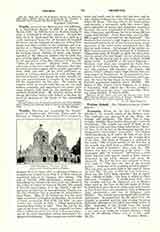

Trumpets, FEAST OF, the first day of Tishri (October), the seventh month of the Hebrew year. Two trumpets are mentioned in the Bible, the shophar and hagogerah. The latter was a long, straight, slender, silver clarion, liturgically a priestly instrument. The shophar was made of horn, as we see from its now and then being called Oren, “horn” (cf. Jos., vi, 5); in fact, in the foregoing passage, it is designated a “ram’s horn”, Oren yobel. The Mishna (Rosh hasshanah, iii, 2) allows the horn of any clean animal save the cow, and suggests the straight horn of the ibex. The Feast of Trumpets is ordained in the words: “The seventh month, on the first day of the month, you shall keep a sabbath, a memorial, with the sound of trumpets” (Lev., xxiii, 24). The Hebrew text has: “a memorial of the blast”. The Septuagint adds “of trumpets” (salpiggon), a word which together with keratine (made of horn) always designates in the LXX, shophar and never the hacocerah. We find the feast also ordained in Numbers, xxix, 1: “The first day also of the seventh month … is the day of the sounding and of trumpets”. This text gives us no more light in the original, where we read only “the day of blast let it be unto you”. Here, too, the LXX emera semasias, “day of signalling”, affords no light. The feast is called by Philo asalpigges, “Trumpets”. It would seem, then, that the shophar and not the hacocerah was in Biblical times used on the feast of the new moon of Tishri. In Rabbinical ritual the festival has come to be known as New Year’s Day (rosh hasshanah), Day of Memorial (yom hazzikkaron), and Day of Judgment (yom haddin). The shophar gives the signal call to solitude and prayer. In preparation for the great feast, the shophar is sounded morning and evening excepting Sabbaths, throughout the entire preceding month of Elul. According to the Mosaic Law, the special offerings of the Feast of Trumpets were a bullock, a ram and seven lambs for a burnt offering; a buck goat for sin offering (Num., xxix, 2, 5; Lev., xxiii, 24, 25).
WALTER DRUM

